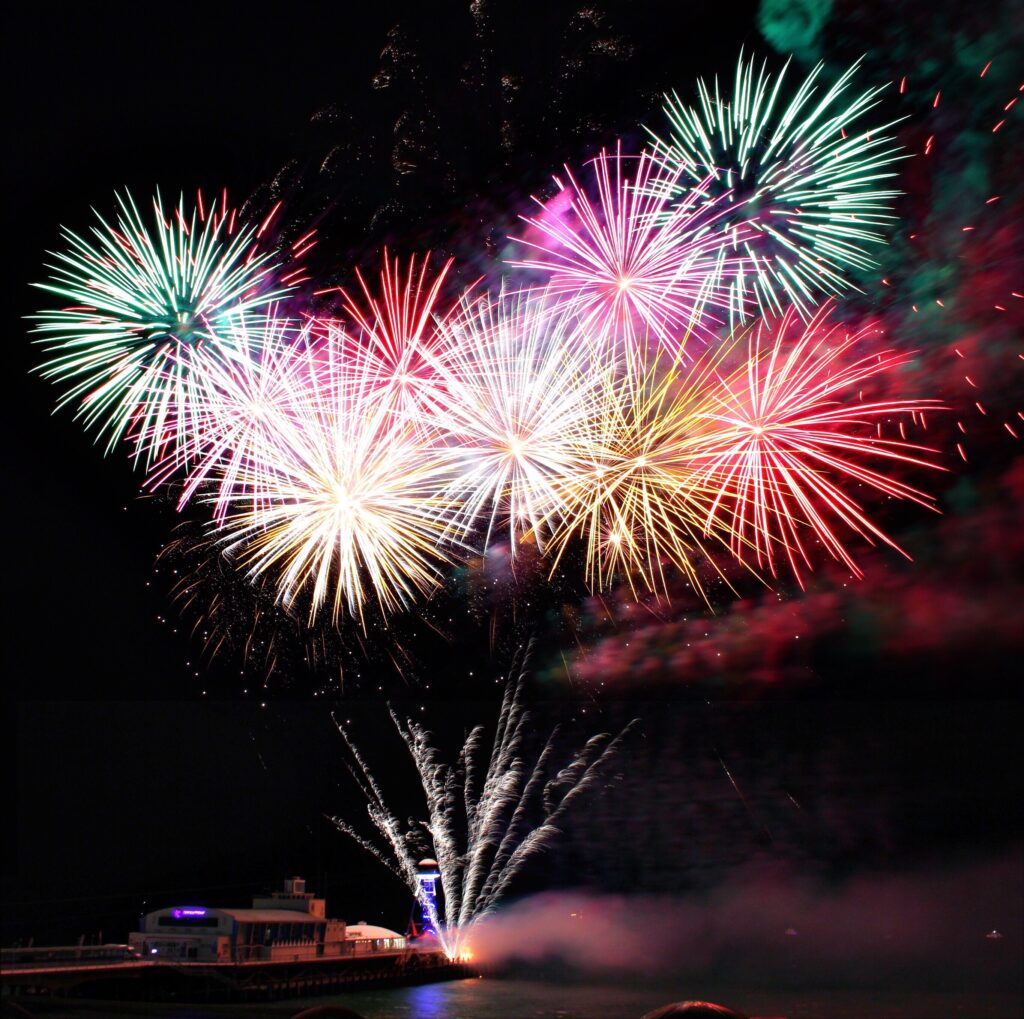Listen to Brenda tell the story
Bang, bang, bang! In the U.S., this noise usually means guns and maybe even another mass shooting. Fortunately for us here in Germany, it just means that it’s that time of year again: December 31st.
New Year’s Eve in Germany means elaborate fireworks displays. But in contrast to the U.S., where the sale of fireworks is severely restricted, Germans are allowed to buy fireworks for their own private pyrotechnical paroxysm. Beginning a few days after Christmas up until New Year’s Eve, the stores fill up with all manner of fireworks for neighborhood displays.
When I first arrived in Germany, I was shocked at the ease with which people could buy fireworks. In the U.S., huge displays are carefully controlled and carried out only be official instances, such as municipal governments, and usually only on July 4th. Lady fingers are the only firecrackers available for sale to the general public in the U.S. and they are so small that the Germans don’t even bother selling them.
Accidents are a regular occurrence at New Year’s fireworks displays. An acquaintance of mine went out to watch the show at midnight with her entire family, including her infant daughter. Someone lit a firecracker and threw it and it landed right inside the baby carriage. She managed to remove it on time, but another friend was not so lucky. A firecracker hit her at the back of her neck, giving her second-degree burns.
The city of Berlin is well known for the huge crowds that gather for demonstrations, parades, concerts – and for New Year’s Eve celebrations. The Brandenburg Gate, once a symbol of German division and subsequent reunification, is now a favored venue for such events. Last year, because of corona, the city of Berlin restricted the sale of fireworks to reduce the amount of contact between people on New Year’s Eve. But Berliners have decades of experience in avoiding governmental restrictions (all those years of communism weren’t for naught) and simply drove an hour to Poland to stock up on fireworks there.
I have a hard time wrapping my head around the nonchalant attitude of Germans towards fireworks and the danger they pose. Cars must be inspected and given a stamp of approval every two years for safety, smoke detectors are checked once a year, and houses are built so airtight that they must be ventilated regularly lest the walls mold. But these same Germans willingly risk life and limb for the opportunity to light up the night sky with decorative explosives.
I’m not the only one frowning on this relish for rockets. Hospitals and clinics are already reeling from corona and other infections and have announced that they are not able to handle the usual New Year’s Eve influx of burns, eye injuries, and even severed digits. They have called for a ban on fireworks, particularly in light of personnel shortages following the pandemic.
Many cities have already outlawed fireworks in their historic centers. This includes the city of Schweinfurt, located on the Main River and whose name, incidentally, means “pig’s ford.” The façade of Schweinfurt’s Renaissance town hall from 1572 was hit by fireworks and caught fire. While pigs no longer ford the Main and are thus not bothered by any fireworks, the same cannot be said for pets, wild animals, and especially birds. Studies have shown that birds are greatly disturbed by the explosions, as evidenced in their flight and feeding patterns on New Year’s Eve and for days afterward.
So if you thought it was unpleasant when your mom burst into your bedroom to wake you up for school in the morning, imagine what it would be like if someone set off a bomb next to your bed in the middle of the night.
It’s also counterproductive to willingly send up clouds of polluting dust – over 2,000 tons of particulate matter, according to the German Ministry for the Environment – while simultaneously searching frantically for solutions to reduce pollution in other areas while the planet steadily warms before our eyes. In some places in Germany, fireworks are forbidden because of the danger of forest fires. Berchtesgaden, like many other Alpine towns, has not had enough rain or snow for several years, leading to forests that have turned into tinderboxes. How appropriate that fireworks, a contributor to global warming, albeit a small one, are forbidden there, too.
At least some towns are using so-called “silent fireworks” which are not entirely noiseless but quieter than the usual blasts. I, for one, will be taking the environmentally conscious (read: easily scared) person’s route: enjoying whatever display there is in my neighborhood – safely ensconced behind the window.
Brenda Arnold
See also:
The French girl who wouldn’t talk
Noise in the modern world—from cacophonous to carefully controlled
Think digital technology is a cure-all? Don’t bet your life on it
